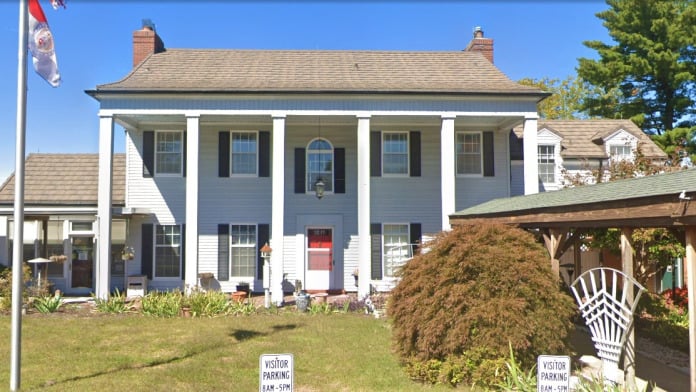Maybe they have a good program at Marygrove but it is completely worthless if the people who work there are uncompassionate and their principal goal isn't helping the patients. I recommend you to go somewhere else!
About Marygrove
Marygrove in Florissant, Missouri is a residential treatment and care facility for children and young adults. They offer 24-hour care for young adults who suffer from substance use disorders, mental or behavioral health disorders, or have experienced abuse, trauma, or neglect.
Marygrove is part of Catholic Charities of St. Louis and has been in operation for more than 175 years. This Florissant location is nestled in a private, wooded area near Sunset Lake Park and Mullanphy Park. They specialize in supporting youth ages six to 21 who are preparing for adulthood and a successful life after experiencing substance use disorder (SUD) or trauma.
Emergency Youth Shelter and Treatment
Marygrove is available for emergency shelter care for youth experiencing crises. This program has 24-hour therapeutic care for residents dealing with crises like trauma, abuse, substance-use disorder, and mental/behavioral health issues.
Emergency staff members include psychiatrists, nurse practitioners, licensed therapists, and more. These individuals create care and treatment plans immediately and they will follow through as the patients stay in the residential housing. I’ve read that previous Marygrove youth reported improved well-being and life skills. Positive client reviews contribute to the overall program’s history in the community.
Residential and Transitional Housing for Young Adults in MO
This facility offers residential and transitional housing for young adults who have experienced substance use disorder, trauma, neglect, or poor childhood conditions. This residential program provides treatment that includes group or individual therapy, trauma-informed approaches, and routines to help prepare young adults for adulthood.
The Marygrove program emphasizes coping skills, positive relationships, and emotional/mental/behavioral health. The multidisciplinary team works with local schools to create a curriculum that aids in the growth of the residents while maintaining a safe and healthy space. They also provide transitional and independent living options for individuals aged 18 years old and up.
Government Funded Residential Program for Youth
This government-funded facility is designed for young adults. There is no mention of the facility accepting private insurance, as most individuals come from child welfare agencies and social services. Government agencies are the primary financial support for Marygrove.
Latest Reviews
Rehab Score
Gallery


Accepted Insurance
Other Forms of Payment
Private insurance refers to any kind of healthcare coverage that isn't from the state or federal government. This includes individual and family plans offered by an employer or purchased from the Insurance Marketplace. Every plan will have different requirements and out of pocket costs so be sure to get the full details before you start treatment.
Self-pay involves paying for treatment out of your own pocket. You can use savings or credit, get a personal loan, or receive help from family and friends to fund your treatment. If you don't have insurance or your insurance plan doesn't cover a specific program, self-pay can help ensure you still get the care you need.
Addiction Treatments
Levels of Care
Residential treatment programs are those that offer housing and meals in addition to substance abuse treatment. Rehab facilities that offer residential treatment allow patients to focus solely on recovery, in an environment totally separate from their lives. Some rehab centers specialize in short-term residential treatment (a few days to a week or two), while others solely provide treatment on a long-term basis (several weeks to months). Some offer both, and tailor treatment to the patient's individual requirements.
Treatments
Many of those suffering from addiction also suffer from mental or emotional illnesses like schizophrenia, bipolar disorder, depression, or anxiety disorders. Rehab and other substance abuse facilities treating those with a dual diagnosis or co-occurring disorder administer psychiatric treatment to address the person's mental health issue in addition to drug and alcohol rehabilitation.
Mental health rehabs focus on helping individuals recover from mental illnesses like bipolar disorder, clinical depression, anxiety disorders, schizophrenia, and more. Mental health professionals at these facilities are trained to understand and treat mental health issues, both in individual and group settings.
Programs
Young adulthood can be an exciting, yet difficult, time of transition. Individuals in their late teens to mid-20s face unique stressors related to school, jobs, families, and social circles, which can lead to a rise in substance use. Rehab centers with dedicated young adult programs will include activities and amenities that cater to this age group, with an emphasis on specialized counseling, peer socialization, and ongoing aftercare.
Clinical Services
Cognitive Behavioral Therapy (CBT) is a therapy modality that focuses on the relationship between one's thoughts, feelings, and behaviors. It is used to establish and allow for healthy responses to thoughts and feelings (instead of unhealthy responses, like using drugs or alcohol). CBT has been proven effective for recovering addicts of all kinds, and is used to strengthen a patient's own self-awareness and ability to self-regulate. CBT allows individuals to monitor their own emotional state, become more adept at communicating with others, and manage stress without needing to engage in substance abuse.
Whether a marriage or other committed relationship, an intimate partnership is one of the most important aspects of a person's life. Drug and alcohol addiction affects both members of a couple in deep and meaningful ways, as does rehab and recovery. Couples therapy and other couples-focused treatment programs are significant parts of exploring triggers of addiction, as well as learning how to build healthy patterns to support ongoing sobriety.
Experiential therapy is a form of therapy in which clients are encouraged to surface and work through subconscious issues by engaging in real-time experiences. Experiential therapy departs from traditional talk therapy by involving the body, and having clients engage in activities, movements, and physical and emotional expression. This can involve role-play or using props (which can include other people). Experiential therapy can help people process trauma, memories, and emotion quickly, deeply, and in a lasting fashion, leading to substantial and impactful healing.
Research clearly demonstrates that recovery is far more successful and sustainable when loved ones like family members participate in rehab and substance abuse treatment. Genetic factors may be at play when it comes to drug and alcohol addiction, as well as mental health issues. Family dynamics often play a critical role in addiction triggers, and if properly educated, family members can be a strong source of support when it comes to rehabilitation.
Group therapy is any therapeutic work that happens in a group (not one-on-one). There are a number of different group therapy modalities, including support groups, experiential therapy, psycho-education, and more. Group therapy involves treatment as well as processing interaction between group members.
In individual therapy, a patient meets one-on-one with a trained psychologist or counselor. Therapy is a pivotal part of effective substance abuse treatment, as it often covers root causes of addiction, including challenges faced by the patient in their social, family, and work/school life.
Nutrition therapy, aka medical nutrition therapy (MNT), is a way of treating physical, emotional, and medical conditions through diet. Specific dietary plans are designed by professional nutritionists or registered dietitians, and patients follow them in order to positively affect their physical and mental health.
Trauma therapy addresses traumatic incidents from a client's past that are likely affecting their present-day experience. Trauma is often one of the primary triggers and potential causes of addiction, and can stem from child sexual abuse, domestic violence, having a parent with a mental illness, losing one or both parents at a young age, teenage or adult sexual assault, or any number of other factors. The purpose of trauma therapy is to allow a patient to process trauma and move through and past it, with the help of trained and compassionate mental health professionals.
Staff
Kathy Fowler
CEO
Teri Gregory
CFO
Courtney Noto
Chief Development Officer
Thomas Coleman
Senior Operations Director
Cameshia Covington
Senior Director of Human Resources
Melissa Rankin-Short
Senior Director of Marygrove Services
Lisa Chrisco
Director of Quality Assurance
Contact Information
2705 Mullanphy Lane
Florissant, MO 63031




